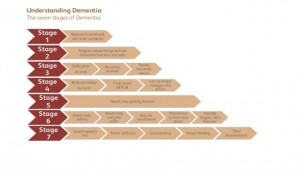Written by: Scott Endsley, MD, MSc., Associate Medical Director for Quality
Dementia is a terminal illness, like cancer or advanced heart disease. Dementia is rapidly increasing in the U.S. and worldwide. In 2012, there were over 5.2 million Americans with Alzheimer’s Disease (AD). By 2025, the number is expected to grow by almost 30% to 6.7 million.[1] Along with the prevalence expanding at epidemic proportions, mortality also continues to increase. It is the 5th leading cause of death in the U.S.[2]
Dementia is a progressive disease with seven stages (figure 1). Alzheimer’s Disease may last for decades, though the mean in eight years. The Global Deterioration Scale[3] is a validated instrument that is helpful in staging the patient along the progression timeline. Memory and function loss proceeds inexorably across the stages until Stage 7 in which the patient has very limited words, incontinence, severe function loss requiring assistance for ADLs, and total disorientation. Median survival in Stage 7 is 1.3 years. Over 80% of patients in this stage have significant eating problems, often requiring assistance. Resultant weight loss is common. Infections, primarily pneumonia and urinary tract infections, are common and carry a high risk of mortality (40% or greater in the CASCADE study[4])
Palliative care is appropriate at any point after diagnosis and may be provided along with symptom management as early as Stage 2. Caregivers and providers are often confronted with the agonizing decision of anticipating death and entering the patient into hospice. Prognostication in advanced dementia is a problematic endeavor. The ADEPT tool has been developed to assist in predicting survival based upon eleven variables in demographics, cognitive status, functional status, active diagnoses. Risk scores greater than 16 (scale 1-32) suggests a six month probability of dying of > 50%. The Medicare Hospice guidelines requires the patient to have significant functional limitation (Stage 7 or beyond of Functional Assessment Staging (FAST) scale) AND at least one of six medical complications in the preceding year including aspiration pneumonia, pyelonephritis, septicemia, multiple decubitus ulcer, recurrent fevers after antibiotics, or inadequate hydration and caloric intake with 10% body weight during previous 6 months (or serum albumin less than 2.5 g/dl). When compared to the ADEPT prognostic tool, the Medicare Hospice guidelines perform less reliability in predicting 6 month mortality.
Recommendations. As your patients with dementia of any type (Alzheimer, vascular, Lewy body) progress through the seven stages, consider the following:
- Educate caregivers on the nature of dementia as a progressive and ultimately fatal disease
- Initiate advance care planning conversations early (stage 1 or 2)
- Ensure that a surrogate has been identified to medical decision making
- Start palliative care in addition to other medical care early or at least by Stage 5 or 6.
- Manage symptoms (neuropsychiatric, incontinence, insomnia) appropriately
- Recommend caregiver assistance early to avoid burn-out and depression
- Consider hospice evaluation at Stage 7
Resources. Many dementia management resources are available. Consult these as needed.
Alzheimer Association: www.alz.org
National Institute for Aging: www.nia.nih.gov/health/alzheimers-dementia-resources-for-professionals
National Hospice and Palliative Care Organization: www.nhpco.org/resources-access-outreach/dementia-resources
[1] Alzheimer’s Association. 2012 Alzheimer’s disease facts and figures, accessed at: www.alz.org/downloads/facts_figures_20122.pdf
[2] Tejada-Vera B. “Mortality from Alzheimer’s disease in the United States. NCHS Data Brief. National Center for Health Statistics, Hyattsville, MD 2013
[3] Reisberg B, Ferris SH, de Leon JJ, Crook T. “The Global Deterioration Scale for assessment of primary degenerative dementia”. Am J. Psychiatry (1982), 139: 1136
[4] Mitchell SL, Teno JM, Kiely DK et al. “The Clinical Course of Advanced Dementia”, NEJM, (2009), 361:1529

